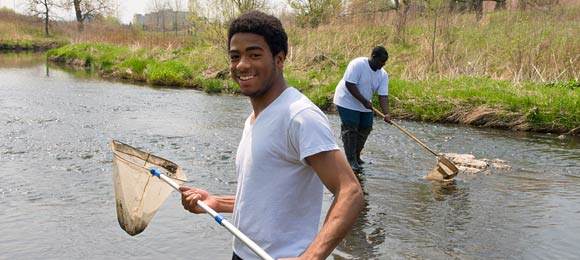
$120 per class
Monday through Friday, seasonally
10 – 11:30 a.m. for 90-minute programs
A 1:10 ratio of chaperones to students is required.
Maximum number of students: 30
Water Quality Field Study (90 Minutes)
Fall, Spring
Identify and count aquatic macroinvertebrates, conduct chemical tests, and analyze observations about environmental conditions to assess lake water quality. This lab supplies students with evidence to explain how stable conditions produce stable populations while changing conditions result in new ecosystems. It also supplies data to create a mathematical representation explaining how environmental factors affect biodiversity in ecosystems of different scales.
Pre- and Post-Trip Activities
Biodiversity Field Study (90 Minutes)
Fall through 10/27, Spring
Students use systematic sampling techniques to collect data about diversity and species variation in different areas of the Garden’s Dixon Prairie. They learn methods to analyze ecosystem health. The experience provides evidence for students to make claims about the stability of an ecosystem and to illustrate the relationship between management of natural resources and biodiversity.
NGSS: LS2.A, LS2.C, LS4.D, ESS3.C
Ecosystems and plant adaptations (90 Minutes)
Early Spring
Plants can survive and even thrive in challenging environmental conditions. Investigate how plants are adapted to abiotic factors in their environment by comparing and contrasting their characteristics and the conditions in which they live.
NGSS: LS1.A, LS1.C, LS4.C, PS3.D
New DIY Hydroponics (90 MinUTES)
Early Winter, Winter
Students work together to define a problem and design a solution: how to build a plant-growing system without soil. Students build, test, and discuss a hydroponic system using their choice of materials and strategies. Their systems can be used to plan and carry out investigations in the classroom or at home.
New Ecology Research Lab (90 MinUTES)
Early Winter, Winter, Early Spring
How do ecologists measure plants? Try several different methods that Garden scientists use to collect data about the conditions in our natural areas. Students compare their findings to our ongoing research. The tools and practices students discover in this lab might stimulate research questions of their own. Activities vary; please call (847) 835-8313 if you would like to discuss specifics prior to your visit.

